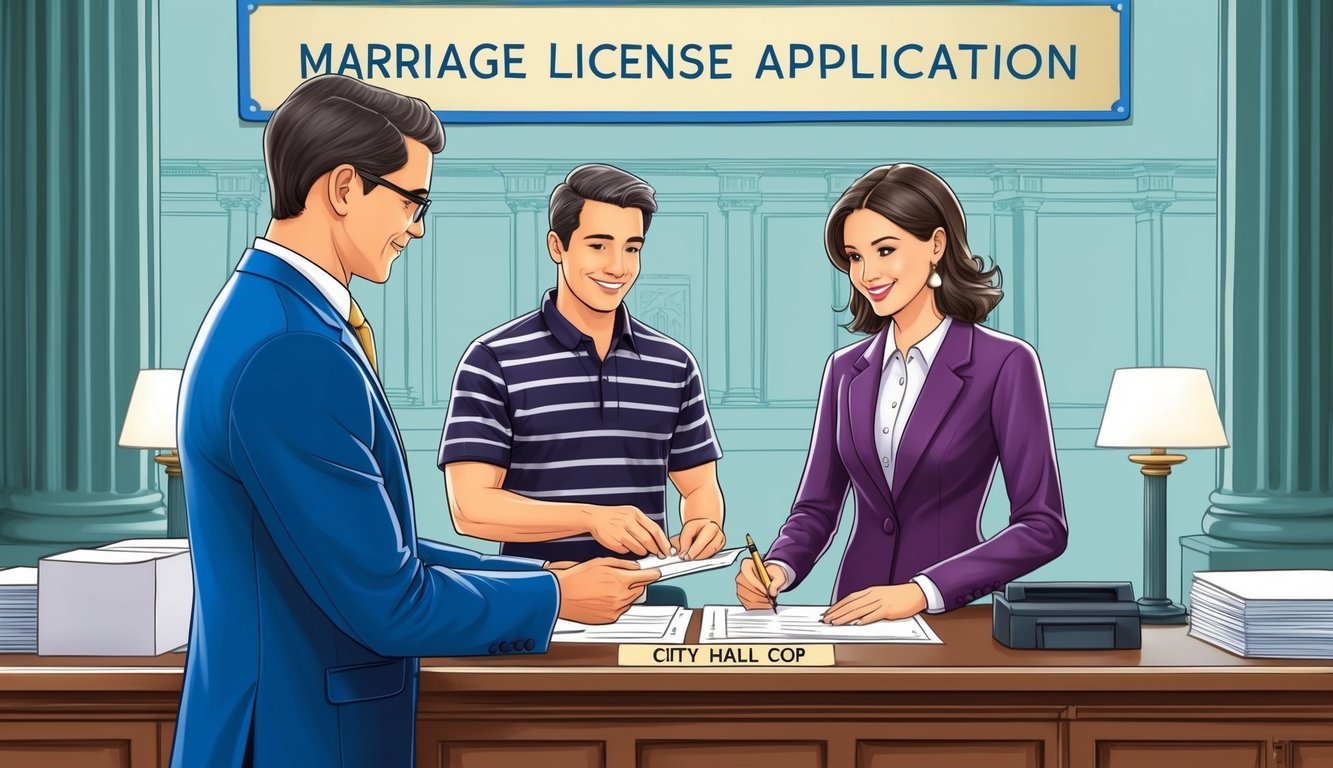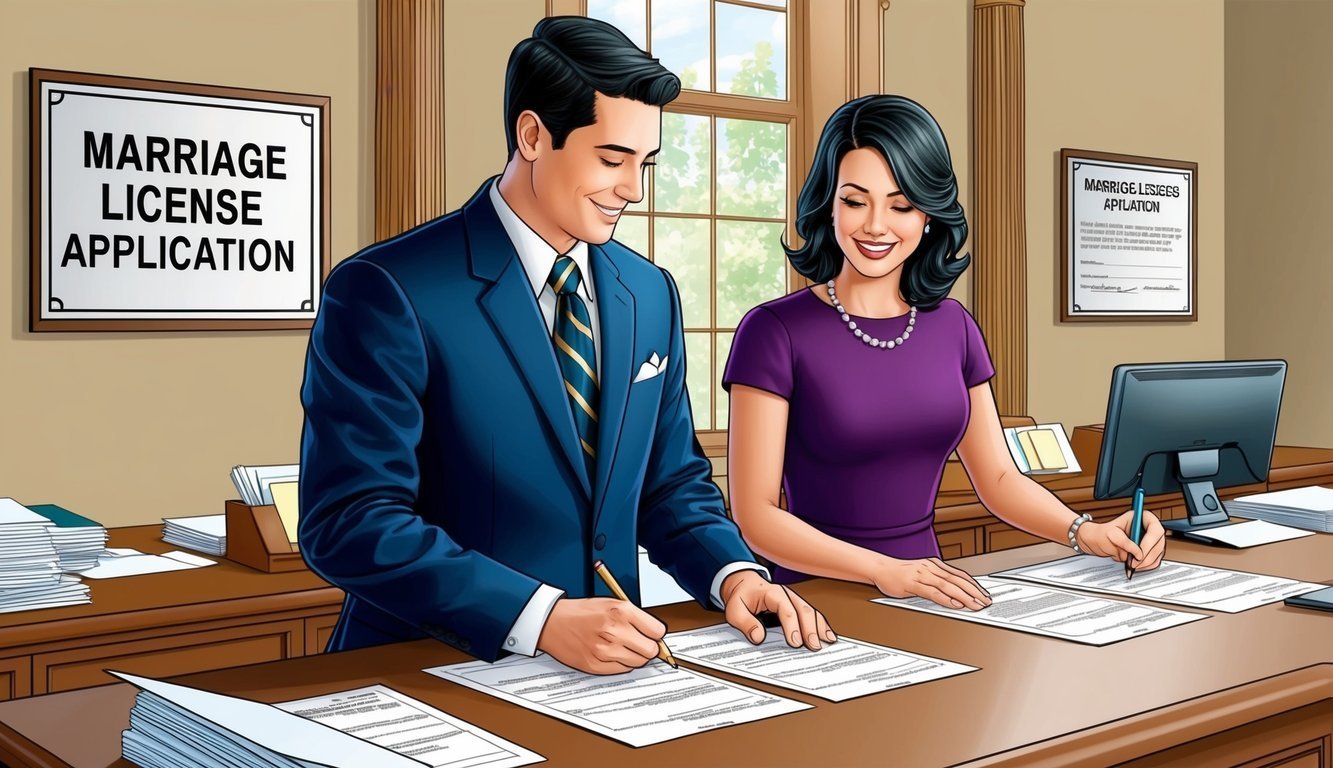Getting married? Exciting times ahead! But before you say “I do,” there’s a bit of paperwork to tackle.
First up, you’ll need a marriage license.
To snag one, you’ll be headed to your local government office to fill out an application and provide some important documents.
Don’t worry; it’s usually a pretty straightforward process, especially once you know what to expect.
alt=’A couple stands at a government office counter, filling out forms with a clerk.
A sign on the wall reads “Marriage License Application.”‘>
Before you hit the office, make sure you’ve got your ducks in a row with the right paperwork.
A government-issued photo ID and your Social Security number are usually on the list.
Some places might also want to see your birth certificate.
I recommend checking what your area specifically requires ahead of time—trust me, you don’t want to make a bunch of trips back and forth.
Having everything ready makes it easier and quicker.
And if you’re scratching your head about how to get a replacement birth certificate, don’t stress; many government websites offer clear, step-by-step guidance.
Being prepared can save you from unnecessary headaches (and delays)!
Keep in mind, marriage licenses don’t stick around forever.
They often expire within 30 days to a year, depending on where you live.
It’s smart to grab your license close to your wedding date, but don’t cut it too close—plan ahead! Once you’ve got that license, keep it in a safe spot.
You’ll need it for the big day and to receive your official marriage certificate later on.
Key Takeaways
- Marriage licenses require specific documents and come with expiration dates.
- Couples should apply at their local government office.
- After the wedding, return the signed license to receive your marriage certificate.
Preparing for Your Marriage License Application
Ready to apply for your marriage license? A little planning goes a long way! Here’s what you need to do:
Understanding the Legal Requirements
First off, know that every state has its own rules about marriage licenses.
Generally, you’ll need to be 18 or older, but some states let younger folks tie the knot with their parents’ permission.
Expect to prove you’re not already hitched.
If you’ve been married before, you’ll likely need to show your divorce papers or a death certificate.
Some states also have waiting periods or require blood tests—the idea of getting pricked is not the most exciting, right? And a few still recognize common law marriage.
It’s all about knowing your local laws, which can vary quite a bit.
Gathering Required Documentation
You’ll want to bring along a few important items when you apply.
Most places require:
- Photo ID (your driver’s license or passport will do)
- Proof of age (a birth certificate works wonders)
- Your Social Security number
Not a U.S. citizen? Make sure to bring proof of your legal status.
And if you’re under 18? Your folks might need to tag along for permission.
If you’ve tied the knot before, don’t forget those divorce papers or your ex’s death certificate.
It’s better to bring along a copy of everything than to miss something crucial—think of it like packing for a trip; it’s better to be over-prepared than stuck in an airport!
Scheduling Your Appointment with the County Clerk
Most clerk’s offices want you to schedule an appointment.
Some even let you start the process online, which is a real time-saver!
Be sure to call ahead or check their website for:
- Office hours
- Fees (bring some cash just in case)
- How long the application will take
- If both of you need to be present
Choose a time that works for both of you and don’t forget your wallet! It can get busy at these offices, so plan for a potential wait.
Completing the Marriage License Process
Getting your marriage license is a crucial step before you tie the knot.
The whole process might involve a bit of paperwork, some fees, and a few important legal requirements—nothing too scary.
The Application and Fees
To kick things off, you and your partner will need to fill out a marriage license application form.
This typically asks for basic info like your full names, birth dates, and Social Security numbers.
Keep in mind that many counties require you to make an appointment with the clerk’s office, so it’s a good idea to call ahead.
Be sure to have valid photo IDs to prove who you are—a driver’s license or passport usually works.
Now, about those marriage license fees—they can vary quite a bit depending on where you are, typically ranging from $30 to $100.
Some places only accept cash, so be ready!
For example, in Colorado, you can apply online, which can save time at the office.
Pretty neat, huh?
Finalizing the Paperwork
After you’ve completed the forms and paid any fees, the clerk will process your application.
They might ask you a few simple questions to ensure everything’s in order.
Once everything’s right, you and your partner will sign the license—this means it’s official, but you’re still not married just yet!
The clerk will hand over your license, which is usually valid for a certain period, often between 30 and 90 days.
Keep that license safe; you’ll need it for your wedding ceremony!
Understanding the Role of Witnesses and Ceremonies
Most states require one or two witnesses to sign the marriage license during the ceremony—these can be friends or family members.
The officiant of your ceremony, whether it’s a judge or a religious leader, also needs to sign the license.
After you tie the knot, the officiant usually sends the signed license back to the county clerk, who records it, making your marriage official.
Congratulations!
After that, you can request certified copies of your marriage certificate, which come in handy for name changes and dealing with official matters.
And if you’re looking for something low-key, some places offer quick ceremonies right at the clerk’s office.
Frequently Asked Questions

Getting a marriage license in Pennsylvania comes with its own set of rules and requirements.
Some counties even offer online applications, while others want you to come in person.
And if you’re considering a self-uniting license, that has its own process too.
What documents do we need for a marriage license in Pennsylvania?
You’ll need valid photo IDs, like your driver’s license or passport.
Don’t forget your Social Security numbers!
If you’ve been divorced, bring along that decree; if you’re widowed, make sure to have your spouse’s death certificate.
Is there a waiting period for a marriage license in PA?
You bet! Pennsylvania has a 3-day waiting period for marriage licenses, starting the day after you apply.
This means you can’t use your license until the waiting period is up, but the license is valid for 60 days after that.
Can you get a marriage license online anywhere in Pennsylvania?
Some counties do allow online applications.
However, most will still require you to visit the office in person to wrap things up.
Best to check with your local clerk’s office for their specific rules!
How much does it cost to get a marriage license in Pennsylvania?
The cost can vary by county, typically ranging from $50 to $100.
Some places offer discounts for couples who complete premarital counseling, so it’s always a good idea to check ahead.
What’s the process for applying for a self-uniting marriage license in PA?
Self-uniting licenses, also known as Quaker licenses, have a different application process.
You might need to explain why you want this type of license and show proof of membership to a religion that doesn’t require officiants.
The fee is generally higher for these licenses.
How do I get a copy of my marriage certificate in Pennsylvania?
After the wedding, you can request certified copies of your marriage certificate from the county office where you obtained the license.
There’s typically a small fee for each copy, and these can be super useful for name changes or other official matters.

